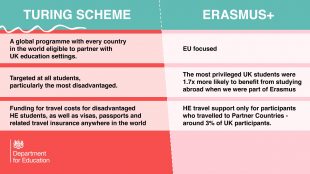
In December we announced the launch of The Turing Scheme. This pioneering £110 million programme replaces the Erasmus scheme and will provide study opportunities abroad for students to develop themselves personally and academically.
The Turing Scheme provides funding for around 35,000 students in universities, colleges and schools to study and work abroad.
It will officially replace the Erasmus Scheme in September 2021.
So what’s the difference between the Turing Scheme and the Erasmus Scheme?
A global Britain: Unlike the Erasmus Scheme, which is mainly EU focused, the Turing Scheme aims to be a truly global programme with every country in the world eligible to partner with UK education settings.
Open to all: The Turing Scheme is targeted at all students, particularly the most disadvantaged. While the UK was part of Erasmus, the most privileged were 1.7 times more likely to benefit from studying abroad. Through the Turing Scheme we are introducing new funding for travel for disadvantaged HE students and new funding for travel-related costs like visas, passports and related travel insurance.
Travel Costs: Eramus+ only provided travel support to participants who travelled to Partner Countries, which was around only 3% of UK participants. With the Turing Scheme, we are we are introducing funding for travel costs for disadvantaged HE students. Additionally, we are providing funding for visas, passports and related travel insurance.
Tuition Fees: As with Erasmus+, we expect tuition fees to be waived by host universities. UK students going abroad for the whole academic year may also continue to qualify for a large contribution made towards their UK tuition fees for the year they are away.
What does this scheme mean for my future?
We want this scheme to address the barriers that prevent some students, particularly those from less advantaged backgrounds, from studying overseas and making life-changing opportunities across the world accessible to everyone studying in the UK.
Once in action, any student can take part if their education setting meets the criteria.
Travelling and studying abroad enables you to develop a deeper cultural awareness. It will also be a great addition to your CV, enabling you to stand out in the global job market and boost your employability.
What settings can take part?
Higher education settings that are officially recognised HE provider registered in the UK or a British Overseas Territory.
Further education and vocational education and training organisations that are registered in the UK or a British Overseas Territory and either:
- an FE college or school active in the field of FE and VET
- a local or regional public authority, coordination body or other organisation with a role in the field of FE and VET
- a company or other public or private organisation hosting, training or otherwise working with learners and apprentices in FE and VET
- a company or other public or private organisation applying on behalf of a consortium of FE and/or VET providers
Schools that are registered in the UK or a British Overseas Territory and either:
- a school providing general, vocational, or technical education on any level from primary school to upper secondary education
- a national school consortium applying on behalf of a number of schools, for example, local or regional authorities, school coordinating bodies or a social enterprise or other organisations with a role in the field of school education.
More information on The Turing Scheme, including regular updates on its roll out, is available here.